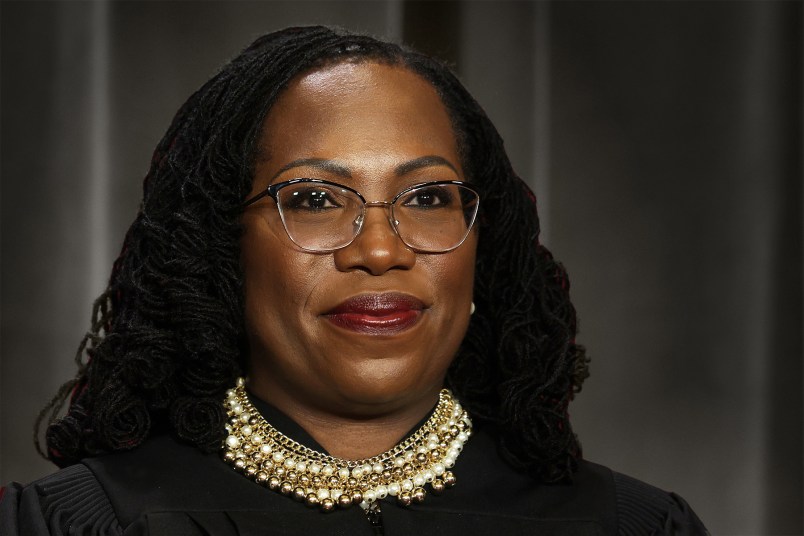The Supreme Court upheld a key mechanism for beneficiaries of federal spending programs to sue if states violate their rights Thursday, the conclusion of a case that spawned protests, hearings and bottomless worry from activists and experts terrified that the Court would use it to hobble programs like Medicaid.
The case grew from a garden-variety Medicaid one, where a nursing home inhabitant’s family alleged that he was ill-treated. But the municipal-run nursing home, Health and Hospital Corporation of Marion County, Indiana (HHC), sensing an opportunity, challenged the mechanism to sue writ large.
Experts pounded the alarm: “This case is to Medicaid what Dobbs was to abortion,” Sara Rosenbaum, professor of health law and policy at George Washington University’s school of public health, told TPM.
And activists started devising plans of action to compel the HHC board to drop the case before the right-wing majority could get its hands on it. While those efforts were ultimately unsuccessful — the case went forward, with oral arguments in late 2022 — the coalition got the result they fought for by a large margin: Justice Ketanji Brown Jackson was joined in her majority opinion by Justices Sonia Sotomayor, Elena Kagan, Amy Coney Barrett, Brett Kavanaugh, Neil Gorsuch and Chief Justice John Roberts. Justices Samuel Alito and Clarence Thomas dissented.
Those most invested in the case were shocked by the outcome.
“I think I’m going to cry now,” Bryce Gustafson, an organizer with Indiana’s Citizens Action Coalition and one of the leaders of the push to get the case dropped, told TPM.
At first blush, the decision “looks like a grand slam for rights under Federal spending clause programs,” Tim Jost, professor of law, emeritus, at the Washington and Lee University School of Law, said.
“The Supreme Court upheld the rights of nursing home residents and other Medicaid recipients on all points, reaffirming decades of federal law,” he added. “Only Justice Thomas would have held that programs established under congress’s spending power are not enforceable by individuals.”
HHC, in a statement provided to TPM, insisted that it was just doing its “fiduciary duty” in bringing the case.
“HHC’s goal was to understand from the Supreme Court the status of the governing law on the availability of federal claims regarding its nursing home operations,” a spokesperson said. “With the Court’s definitive answer today that Medicaid-supported nursing home residents have both administrative and federal court remedies for alleged violations, HHC will continue to work to manage those operations safely and effectively and analyze the impact of the decision on those public resources.”
This pathway to sue, known as private rights of action under Section 1983, is critical for holding states accountable to make sure they provide the full services they’re required to within these spending programs. Without it, those who depend on federally-funded, state-administered programs — think Medicaid, SNAP (formerly known as food stamps) or WIC, which helps low-income pregnant women and mothers with young children buy food — are left with little recourse should states stop providing the benefits they’re required to give.
The federal government doesn’t have many tools in its arsenal to force compliance, and lacks the resources to police all the various state programs for evidence of wrongdoing. These lawsuits, then, also serve as red flags to point Health and Human Services (HHS) towards the biggest offenders.
“Looking to history, HHC attempts to sow doubt about [Section] 1983’s textually unqualified sweep, and proffers a Spending Clause-based argument to narrow [Section] 1983’s meaning,” Jackson writes. “But a fuller picture of the relevant history lends HHC no aid.”
Gorsuch and Barrett both wrote separate concurrences. Gorsuch poses questions about spending clause rights he said the petitioners didn’t raise fully — “questions for another day” — and Barrett emphasizes that she didn’t want use of 1983 rights of actions to become too common.
“Courts must tread carefully before concluding that Spending Clause statutes may be enforced through [Section] 1983,” she says. “In this case, however, the Seventh Circuit correctly allowed Talevski’s [Section] 1983 suit to proceed.”
Thomas, in a lengthy debate in his favorite style — drawing upon select episodes of history, particularly from America’s founding — rejects the broader conclusion that 1983 rights of action are legitimate under federal spending clause legislation.
“Either conditions in statutes enacted under the spending power are in the nature of contract terms and do not secure rights by federal law, or they are unconstitutional because they exceed the spending power and illicitly commandeer the States,” he writes. “The consequence of the majority’s rejection of the contractual understanding is not that spending conditions are enforceable under [Section] 1983. Rather, it is that they are unconstitutional.”
Alito’s dissent is somewhat narrower. He finds that the rights of nursing home patients, embedded in the Medicaid statute, provide remedies for patients who have their rights violated, and that also allowing the 1983 suits would “upend this careful balance.”
Read the opinion here:







I say we spend $50 million of taxpayer money to bribe John Roberts into retirement, then nominate KBJ to be the next Chief.
Alito and Clarence the Corrupt in dissent. Who could’ve guessed. I’m just glad the other four did the correct thing with their votes.
The money might be better spent if you give it to Thomas. He’s already established that he’s a relatively cheap buy. Just saying…
I mourn that I only have one like to give.
Is there some mysterious thing happening at SCOTUS? They are actually ruling for fairness and justice?
Waiting for the other shoe…